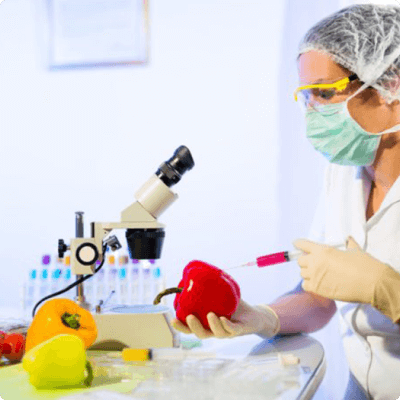
B.Sc. Food Science Eligibility, Fee, Syllabus, Cousre, Salary
- medical
Notification:

Table of Contents
Climbing demand for products related to increased cultural sensitivity to health and quality of foods is a clear implication of the need for more food scientists. A B.Sc. Food Sciences teaches students how to produce, prepare, preserve, package, and dispose of food items. Graduates of this degree can work in safe, healthy, and sustainable food sectors. Modern living prioritises food security and innovation. Therefore, food science degrees are crucial to improving food technology and quality of life.
A B.Sc. Food Sciences is a three-year study that teaches food science and technology. The program covers food chemistry, microbiology, processing, and nutrition. Nutrition and food students learn about crop production, cropping, processing, and preservation. Combining apriori science with program practice may include food quality management, packaging, and safety regulation. Graduates are prepared to tackle new food business difficulties caused by societal changes that necessitate new food solutions. It also teaches students about food sustainability trends and technology, which are global challenges. Interdisciplinary courses enhance critical thinking since graduates can work in research, food safety, or product creation.
| Degree | BSc Food Sciences |
| Course Level | Undergraduate |
| Duration | 3-year |
| Examination type | Semester Based |
| Eligibility | Passed 10+2 with 50% marks |
| Admission Process | Merit-Based |
| Course Fee | INR 2,000 to INR 18,000 per month |
| Average Salary | INR 2,00,000 to 4,00,000 |
| Top Recruiting Areas | Agriculture Sectors (research), Universities, Food & Nutrition Consultancies. |
| Job Roles | Food Research Analyst, Food & Nutrition Services Manager, Food Technologist, Nutritionist & Dietician |
For joining any B.Sc. Food Sciences course, the candidate should have finished their 10+2 education with science background from recognised board and should have passed in Biology, Chemistry and Physics subjects.
Additional requirements may include:
India has several reputed institutions offering B.Sc. Food Sciences programs. Some of the top colleges include:
| College Name | Course Fee |
|---|---|
| Andhra University | INR 2.30 Lacs |
| Dr. BMN College of Home Science | INR 36,181 |
| University of Science and Technology | INR 2.21 Lacs |
| Budge Budge College | INR 26,790 |
A B.Sc. Food Sciences program covers various interdisciplinary subjects combining food science, technology, and management. Core subjects include:
| Semester 1 | Semester 2 |
|---|---|
| Introduction to Biology | Technical Writing in English/ Computational Techniques |
| Introduction to Food Technology-I | Chemistry |
| Mathematics and Statistics | Introduction to Food Technology II |
| Technical Writing in English / Computational Techniques | Principles of Food Science |
| Semester 3 | Semester 4 |
| Technology of Fruits Vegetables and Plantation Crops | Technology of Cereals, Pulses and Oilseeds |
| Foundations of Food & Nutrition | Principles of Food Preparation |
| Food Processing and Engineering | Biochemistry |
| Project Management and Entrepreneurship | Food Engineering |
| Technology of Dairy and SeaFood | Technology of Meat, Poultry & Eggs |
| Food Chemistry I | Food Chemistry II |
| Food Microbiology | Food Safety |
| Food Quality Testing and Evaluation | Food Quality Management. |
Practical sessions, Internship and industrial training is very much included in the program to make the students more familiar in food preparation and safety measures.
A graduate of a B.Sc. Food Sciences can further his or her education to be specialised in food science and technology, food safety, and product innovation.
Scholars can pursue higher education and work in research institutions, colleges or universities or be promoted to higher positions in the food chain businesses.
The salaries that can be expected by B.Sc. Food Sciences graduates in India when starting off are somewhere between ₹25000 – ₹50000 per month.
career paths and their associated earning potentials are outlined below:
| Job Profile | Average Annual Salary |
|---|---|
| Food Technologist | INR 1,000,000 |
| Dietitians | INR 6,02,003 |
| Nutritionist | INR 302524 |
| Quality Control Manager | INR 40,000 |
| Food Safety Officer | INR 45,000 to ₹50,000 |
| Food Product Developert | INR 40,000 to 80,000 |
Graduates of B.Sc. Food Sciences can explore additional income streams beyond traditional roles, including:
A B.Sc. Food Sciences course opens a competitive, dynamic gateway to the field of food, empowers graduates with the ability to solve some of the world’s largest problems in food safety, nutrition and food processing. Employment prospects encompass many areas, including work of food technologists and specialists in quality control, product developers, or researchers. The program not only sharpens knowledge base in food science but it also produces the human capital capable of impacting society positively.
How likely are you to recommend Medicaljagat.com to a friend or a colleague?